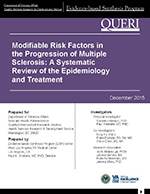
Principal Investigator:
Susanne Hempel, PhD;
Paul Shekelle, MD, PhD
Co-investigators:
Ning Fu, PhDc;
Elena Estrada, BS, BA, MS;
Annie Chen, BS, BA
Download PDF: Complete Report, Executive Summary, Report, Appendices
Multiple sclerosis (MS) is the most common progressive disease of the central nervous system in young adults and the cause of serious physical disability in adults of working age. Epidemiologic data suggest that rates of MS vary with demographic and environmental factors. The disease presentation is very heterogeneous with diverse clinical manifestations. Progression of MS may vary with modifiable risk factors.
This systematic review focused on modifiable risk factors and exposures that are associated with MS progression, and interventions that are directed at modifiable risk factors to delay progression.
KQ1: What modifiable epidemiologic factors are related to multiple sclerosis progression following diagnosis?
KQ2: What environmental exposures prior to or during military service are related to multiple sclerosis progression following onset symptoms?
KQ3: Among identified risk factors for progression, what treatment/risk factor modification therapies have been shown to delay or hasten the progression of multiple sclerosis once it has initiated?
Systematic Review: Modifiable Risk Factors in the Progression of Multiple Sclerosis (Management eBrief)
Hempel S, Graham GD, Fun N, et al. A systematic review of modifiable risk factors in the progression of multiple sclerosis. Multiple Sclerosis Journal. Published online ahead of print February 2, 2017. DOI: 10.1177/1352458517690270.
Hempel S, Graham GD, Fu N, et al. A systematic review of the effects of modifiable risk factor interventions on the progression of multiple sclerosis. Multiple Sclerosis Journal. Published online ahead of print February 2, 2017. DOI: 10.1177/1352458517690271.